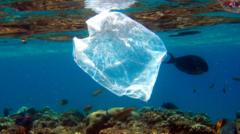Can Banning Plastic Bags Really Reduce Shoreline Litter in the US?

Understanding the Impact of Plastic Bag Regulations on Shoreline Pollution in the U.S.
Plastic pollution has become one of the most pressing environmental challenges of our time, especially as it pertains to coastal ecosystems. Recent research indicates that implementing bans or charging fees for plastic bags has shown a significant effect on reducing the number of these bags found on U.S. shorelines. This article delves into the implications of these findings, the effectiveness of various policies, and the broader context of plastic pollution in America.
The Growing Concern of Plastic Pollution
Plastic pollution is pervasive, affecting marine life, ecosystems, and even human health. Plastic bags, specifically, are a notable contributor to this problem. They are lightweight, easily carried by wind, and often end up in the ocean, where they can harm wildlife and disrupt marine habitats. The environmental impact of plastic bags is not just a local issue but a global one, with millions of tons entering the oceans each year.
Research Overview: Methodology and Findings
To assess the effectiveness of plastic bag regulations, researchers conducted an extensive analysis of data from over 45,000 cleanups across the United States from 2016 to 2023. This study focused on comparing areas with plastic bag policies against those without, evaluating the percentage of bags found during shoreline cleanups. Here are the key findings:
- Reduction in Bag Usage: Areas that implemented bans or bag fees saw a decrease in plastic bags by at least 25% compared to those that did not.
- State vs. Local Policies: State-level policies were more effective than local town regulations in reducing plastic bag litter.
- Higher Baseline Impact: Areas with initially higher litter levels experienced a more pronounced effect from regulations.
Types of Plastic Bag Policies in the U.S.
Plastic bag regulations in the United States vary significantly from one jurisdiction to another. These policies can broadly be categorized into:
Bans
Some states and municipalities have instituted outright bans on plastic bags, particularly thinner, single-use varieties. These bans aim to eliminate the use of plastic bags altogether.
Charges
In other areas, a fee is imposed on plastic bags. This approach encourages consumers to bring reusable bags while generating revenue that can be used for environmental initiatives.
Partial Bans
Some areas have opted for partial bans, prohibiting only certain types of plastic bags while allowing others, leading to mixed results in litter reduction.
Pre-emption Laws
In some cases, state governments have enacted laws that prevent local governments from implementing their own regulations. This can hinder the effectiveness of localized efforts to reduce plastic bag use.
Analyzing the Effectiveness of Policies
The study's authors employed various analytical models to compare the data collected during cleanups. They found that the relative decrease in plastic bags in areas with regulations ranged from 25% to 47%. On average, plastic bags accounted for about 4.5% of items collected, making them the fifth most common type of litter found on shorelines.
Challenges and Continued Growth of Plastic Pollution
While the research indicates that policies are effective in reducing the percentage of plastic bags collected, it is crucial to recognize the broader trend of plastic pollution. Overall, the number of plastic bags found on shorelines is still increasing, albeit at a slower rate in regulated areas. This highlights the need for more comprehensive solutions to tackle plastic pollution.
The Role of Global Agreements and Comprehensive Policies
As highlighted by lead study author Anna Papp, while plastic bag regulations can significantly reduce litter, they represent only a part of the broader plastic pollution issue. A global plastics treaty, which 175 nations are negotiating, could offer a more holistic solution to the problem. Such a treaty would need to address:
- Production of plastic materials
- Consumption patterns
- Waste management strategies
The urgency for comprehensive solutions cannot be overstated. Without addressing these foundational issues, localized efforts may only scratch the surface of the plastic pollution crisis.
Global Comparisons: The UK Experience
The United Kingdom serves as a valuable case study in plastic bag regulation. Since the introduction of charges on single-use plastic bags in 2011, reports indicate an 80% reduction in the number of bags found washed up on beaches over a decade. This success story underscores the potential for legislative measures to drive significant behavioral change among consumers.
Conclusion: The Path Forward in Combating Plastic Pollution
In conclusion, the research indicates that banning or charging for plastic bags can effectively reduce their prevalence on U.S. shorelines. However, it also emphasizes the need for more comprehensive strategies to address plastic pollution at its source. As communities and policymakers consider new regulations, the importance of global cooperation and multifaceted approaches cannot be overstated. It’s essential to continue advocating for policies that not only target single-use plastics but also promote sustainable practices in production, consumption, and waste management.
Frequently Asked Questions
What are the primary contributors to plastic pollution in the ocean?
The primary contributors to plastic pollution include single-use plastics like bags, straws, bottles, and food wrappers, as well as larger items that break down into smaller microplastics.
How do plastic bag bans impact consumer behavior?
Plastic bag bans often encourage consumers to switch to reusable bags, reducing overall plastic consumption and fostering a culture of sustainability.
Are there other effective measures to reduce plastic pollution?
Yes, besides bag regulations, measures such as recycling programs, education campaigns, and incentives for using sustainable materials can contribute significantly to reducing plastic pollution.
As we reflect on the findings and their implications, how can you contribute to reducing plastic pollution in your community? #PlasticPollution #Sustainability #EnvironmentalAwareness
Published: 2025-06-19 18:03:04 | Category: technology



